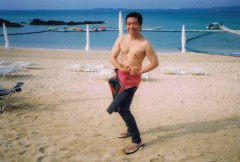23 September 2013
Destroying "Finding Nemo"s World
Last weekend I visited Okinawa, Southernmost prefecture island. Over there I saw such cute view like Disney's animated film "Finding Nemo."

Clown fish over sea anemone with a blue fish. Looks like Marlin and his son, Nemo and their friend, Dolly. I was amazed but felt so sad at the same time. Because their lives are now in threat by planned construction of US Marine Base runway expanding from Camp Schwab.
The fish were in Ohura bay, which has been designated as most vulnerable place for environmental destruction because of rich bi-diversity such as clown fish, blue coral reef (the world biggest and Northernmost of its kind), dugongs and so on. If the runway is constructed by reclaiming the sea, the sea current will change and environmentally harmful substances would be released from the base. That must give adverse effect on wildife there.

I scuba-dove into the sea from the opposite side of the bay to the U.S. Marine Base. Far away behind me in the above picture is where US Marine Camp is and where runway is planned to be constructed.
Growning opposition has emerged recently from localies. But the US and Japanese government are pushing hard to implement the project.
That coincides with hypocrisy in the film. That was, of course animated fiction. Fish don't talk and read. The film portrays them as good living creatures like human beings. In reality we eat fish and hunt them and put them in small aquarium unit just for viewing. In fact after the release of the film, clownfish were hunt overwhelmingly.
U.S. pretends like tropical fish loving and environmetally friendly nation but the reality is opposite and their act is very hyporitical. Not just Disney's fantazy but US policy against Japan's whaling. US is accusing Japan of whaling but at the same time it is harming most endangered marine mammals, dugongs in the bay with Defense Ministry of Japan. Some environmetal activists like Sea Shepherds even oppose dolphin hunting in Taich town of Wakayama Prefecture.
"Finding Nemo" is after all, Finding Nonesense and Hypocrisy.
12:48 Posted in Ecology, Film, Politics, Travel, US-Japan relationship, USA issues | Permalink | Comments (0) | Tags: okinawa, military
17 August 2013
Making a novel based on my alma mater's history
Last month I attended my alma mater's alumni event in Tokyo.
A lot of alumni living in Japan gathered at a restaurant exchanging memories and update information of the university. One faculty member from SFSU joined and told me about current situation. I graduated in late 1990's. He said a lot more buildings were constructed on campus.
But most surprising attendees were alumnis who graduated in 1960's. They were oldest in the group. He told us about his experience in that period. There was a student strike movement in those days following civil rights act. Ethnic minority students demanded the university to require all the students take ethnic minority study related subjects. They had been frustrated with racism in the university. Classes were boycotted and school buildings were occupied. The president of the university was changed during that time. It was Dr. Hayakawa, Japanese American. He accepted that demand.
Since then SFSU requires all the students to complete ethnic minority related courses. I did, of course. I remember what I took were Japanese American studies, Black studies, LGBT studies, and history of Japanese and Chinese women. Those were greatest studies in my life.
That ethnic study requirement was what my alma mater first acquired and spread all over the US. It was a good thing that I am proud of as alumni.
So my novel idea is based on what I heard and I research.
One Japanese student who grew up in a conservative family, Hiroshima, 1960's joined the university. He longed for America and American culture. He met a lot of kind of students there and instructors. One of them was an English teacher who was Japanese American, strict and conservative. Because of his instruction his English ability improved faster.
The strike started. The president was changed. It was that Japanese American teacher. The Japanese boy expected him to understand the movement because of his ethnicity but he was actually opposing that movement and trying to supress the students.
The Japanese boy along with his friends who were white, Afro-American, Asian Americans negotiated with him. He used what he learnt and loathed from his childhood to convince the president. Japanese heritage, tea ceremony, Kendo and so on.
Sounds interesting, doesn't it?
The theme song should be "Blowing in the wind." The answer is blowing in the wind.
23:08 Posted in Culture, My novel, US-Japan relationship | Permalink | Comments (0) | Tags: literature, history, racism
30 July 2013
Film"EMPEROR" Honne (true feeling) and Tatemae (appearance)
I just saw the film. It was not excellent but not bad, actually it was good considering it was made by Americans. It was indeed made from American perspective but thoroughly desriptive about Japanese personality and culture.
The story was based on memoirs of a former military officer who did research on the emperor's responsibility for the second world war. He interviewed with former politicians, military officers, and servants for the emperor to learn about what Emperor actually did before the war and end of the war. He also tried to find where his loved Japanese woman was.
One of impressive things about the film was one former prime minister said "Japan just followed what US and European nations did in terms of invading China and Phillipine. But why were westerners never convicted?"
The film described difference between Honne (true feeling) and Tatemae (appearance). Japanese seem to be calm in apperance but in their mind they have strong feeling and devotion which can make them brutal.
Emperor's role was very ceremonial so he was not actual starter of the war. It was the nation and militants that led the war.
However, I want to rate this film "B" not "A." It contains love romance essence but the conclusion of the romance was not what I expected. It was reverse and not so good.
Emperor has no responsibility for the war act. Not totally true. Recent research suggests the emperor actively coped with military people.
I just could not be totally satisfied with the film. I wanted more twists and surprises. Kind of clechay for Japanese who has studied this part of history.
Personally it was really helpful to me. I recently started to write a novel on the same period of the history. Mine is gender reverse. American woman and Japanese man. The woman character is inspired by a true character who helped rebuild and democratise Japan in post-war era. She visited Japan before the war.
Hope mine will come out as a film like this film.
00:45 Posted in Culture, Film, Politics, US-Japan relationship | Permalink | Comments (0) | Tags: history, military, war
15 April 2013
My comment on NBC News article on Okinawa issue
I posted the below comment on the NBC news article,
In Okinawa, the war isn't over: Protests aimed at new US base
-

-
!
![]() #99 - Mon Apr 15, 2013 8:46 AM EDT
#99 - Mon Apr 15, 2013 8:46 AM EDT
22:24 Posted in Media, Politics, US-Japan relationship | Permalink | Comments (0) | Tags: okinawa, military






As a Japanese citizen living in Tokyo, in response to the above comments, I would like to make the below comments.
1. Japan including Okinawa surrendered to the Allied force unconditionally, therefore Japan and Okinawa should endure current situation?
Japan regained independence 61 years ago, both nations signed the treaty to recognize each other's sovereignty. That means the U.S. should treat Japan as independent nation. Who lost or won was officially resolved by that treaty. Of course emotional issues are other things.
Yes, we did the wrong things. Japan attacked Pearl Harbor and started the stupid war. Even before Pearl Harbor Japan invaded China and mass-murdered innocent civilians there. That is the history just like US overthrew Hawaiian kingdom in 19th century, almost half a century before Pearl Harbor attack. What did native Hawaiians think when Asians attacked white dominated empire's military bases? Interestingly enough, Okinawa used to be independent kingdom which was overthrown by Japan in the same period.
2. Without US military presence, Japan and Okinawa can never defend themselves from China or North Korea?
Japan might not be ready for its own defense. But the problem is the US military no longer functions as defense force. Yes, US-Japan defense treaty is still effective but what would US actually do when some disputes occure is different matters. Can US fight against China over Japan's sovereignty? The US is heavily dependent on China economically. China owns more US treasury bonds than Japan does. China produces many US goods such as iphone and toysrs toys as much as China consumes many US goods such as Boeing and Motorolla.
As for North Korea, their only effective weapons are nuclear missiles. Once they launch missiles, it would reach to Japan within minutes. No way to stop it. Only few of them may be blocked by pac or easis. NK is like suicidal nation. No nuclear deterrence works since they are never afraid of retaliation.
Besides above two issues, the construction of new marine runway in Henoko, near Camp Schwab involves huge environmental issue. The expected construction site is where endangered marine mammals, dugons inhabit. As I remember, US is accusing Japan of whaling in Antarctica.
Plus, more of Japanese learn US is exploiting Japan's tax money and causing troubles although US is no longer reliable force for the defense. We are learning US is spending too much money on military expense while impoverishing its own people. Gap betwen the rich and the poor among Americans is widening. A lot of us say US is no longer role model for us, rather they have become model for "Dont be like them."
I graduated from the university in San Francisco 15 years ago. I have good memories there and still have good image of your people. So I would advise your goverment and military to reconsider what to do about this issue for the benefit of both nations.
If you would like to know more about what is happening in Okinawa, I recommend my blog articles relating to this issue. I visited Okinawa several times since this problem erupted.